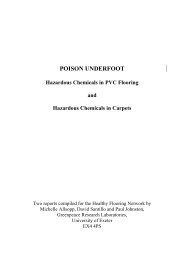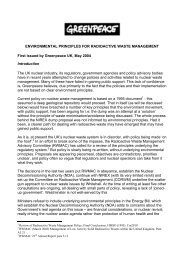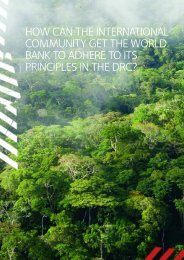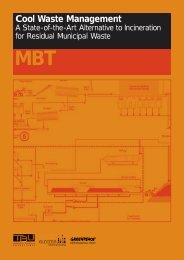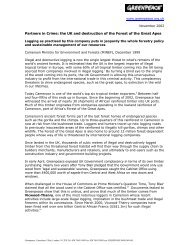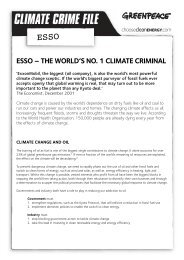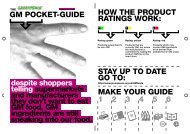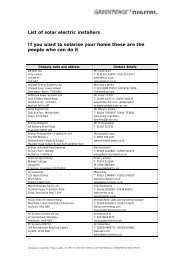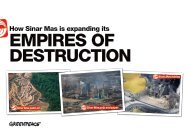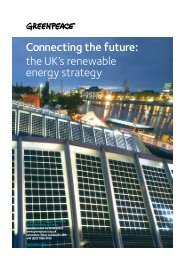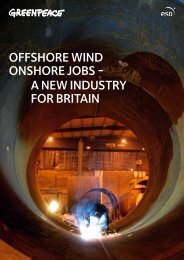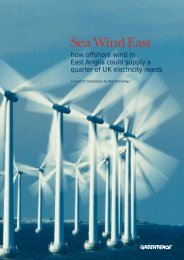EATING UP THE AMAZON 1
EATING UP THE AMAZON 1
EATING UP THE AMAZON 1
You also want an ePaper? Increase the reach of your titles
YUMPU automatically turns print PDFs into web optimized ePapers that Google loves.
18<br />
<strong>THE</strong> BANKS BEHIND <strong>THE</strong> MAGGI BULLDOZER<br />
‘The fact that problems exist within a<br />
sector does not mean that a single actor<br />
who behaves in a responsible way should<br />
not be supported.’<br />
IFC/World Bank Brazil Country Manager Wolfgang<br />
Bertelsmeier justifying a US$30 million loan to Grupo André<br />
Maggi, 23 July 2003 59<br />
International lenders are playing an important role in the<br />
expansion of large-scale soya cultivation, providing capital<br />
for infrastructure development, agrochemical inputs and<br />
prefinancing of farmers. 60 The case of Grupo André Maggi<br />
demonstrates how multiple public and international loans<br />
for soya production, processing facilities and transport<br />
infrastructure are pushing the conversion of the Amazon<br />
rainforest into a vast monoculture.<br />
Grupo André Maggi has had easy access to financing from<br />
public and private banks in Europe and Japan, and from the<br />
IFC, totalling more than US$660 million. 61 These loans have<br />
helped the company finance advance payments to suppliers<br />
and infrastructural development for the storage and<br />
transport of soya.<br />
In 2002, Grupo André Maggi landed the first of two US$30<br />
million loans from the IFC in order to enlarge the company’s<br />
storage capacity and to finance soya production by its<br />
contract farmers. The IFC justified this by saying that<br />
even if the soya sector as a whole was under criticism,<br />
individual companies with a ‘good performance’ could surely<br />
still be financed. 62 The IFC is bound to the World Bank’s<br />
development mandate, and aims to ‘promote sustainable<br />
private sector investment in developing countries, helping<br />
to reduce poverty and improve people’s lives.’ 63 It has<br />
specific guidelines stipulating that projects be screened and<br />
classified according to the environmental and social impacts<br />
that could result from project funding. 64<br />
In 2004, only 15% of the Grupo André Maggi’s total output<br />
came from its own farms. The remaining production came<br />
from some 2,000 third-party farmers, of which 45% were<br />
prefinanced through the ‘Amaggi Expansion Project.’ 65<br />
In 2004, the then World Bank President James<br />
Wolfensohn called for an audit of the IFC’s loan to Grupo<br />
André Maggi. 66 The audit found that the IFC had not<br />
undertaken a sufficiently rigorous assessment of the<br />
company, and that therefore its assessment of the loan<br />
as low-risk could not be justified. 67 For instance, under<br />
the Forest Code of the Unified Environmental Law in<br />
Brazil, property owners are required to retain a specified<br />
percentage of native vegetation (80% for forest<br />
areas, 50% for cerrado). The review found that these<br />
requirements were not met on farms covering two-thirds<br />
(55,000 hectares) of Maggi-owned land 68 – in other<br />
words, the farms had broken the law.<br />
Furthermore, the review did not even investigate compliance<br />
with the forest code by the third-party farms, even though<br />
almost 90% of the overall budget for the IFC Amaggi<br />
Expansion Project was to support the prefinancing of these<br />
farmers. 69 The fact that this legislation is so frequently<br />
violated leads one to conclude that the environmental<br />
cost of financing Grupo André Maggi extend beyond the<br />
company itself.<br />
However, the fact that the IFC had classified Grupo André<br />
Maggi projects as ‘category B’ – ie of low environmental<br />
risk – and approved loans for these projects meant that<br />
private banks considered it unnecessary to evaluate<br />
and monitor the company according to their own<br />
environmental and social policies, including prohibitions<br />
on conversion of rainforest and monocultural methods. 70<br />
For instance, Rabobank, the Netherlands’ biggest<br />
agricultural bank, has led the provision of two loans<br />
together worth US$330 million: an IFC audit report found<br />
that ‘Rabobank’s reasoning [for giving Maggi the loan]<br />
was that if IFC approves this project and they classify it<br />
only as a class B, low-risk project, we can safely invest<br />
$230 million [the value of the second loan], eight times<br />
more than what IFC is investing, in this corporation.’ 71<br />
Some private banks, such as HSBC, that have previously<br />
financed Grupo André Maggi 72 are beginning to grapple<br />
with the problem of withdrawing finance from rainforest<br />
destruction. In May 2004, HSBC introduced a policy<br />
that states that it will no longer finance projects ‘located<br />
in and which significantly degrade or convert Critical<br />
Natural Habitats.’ 73



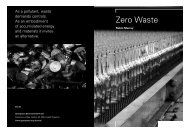
![[2007] EWHC 311 - Greenpeace UK](https://img.yumpu.com/22079793/1/184x260/2007-ewhc-311-greenpeace-uk.jpg?quality=85)
